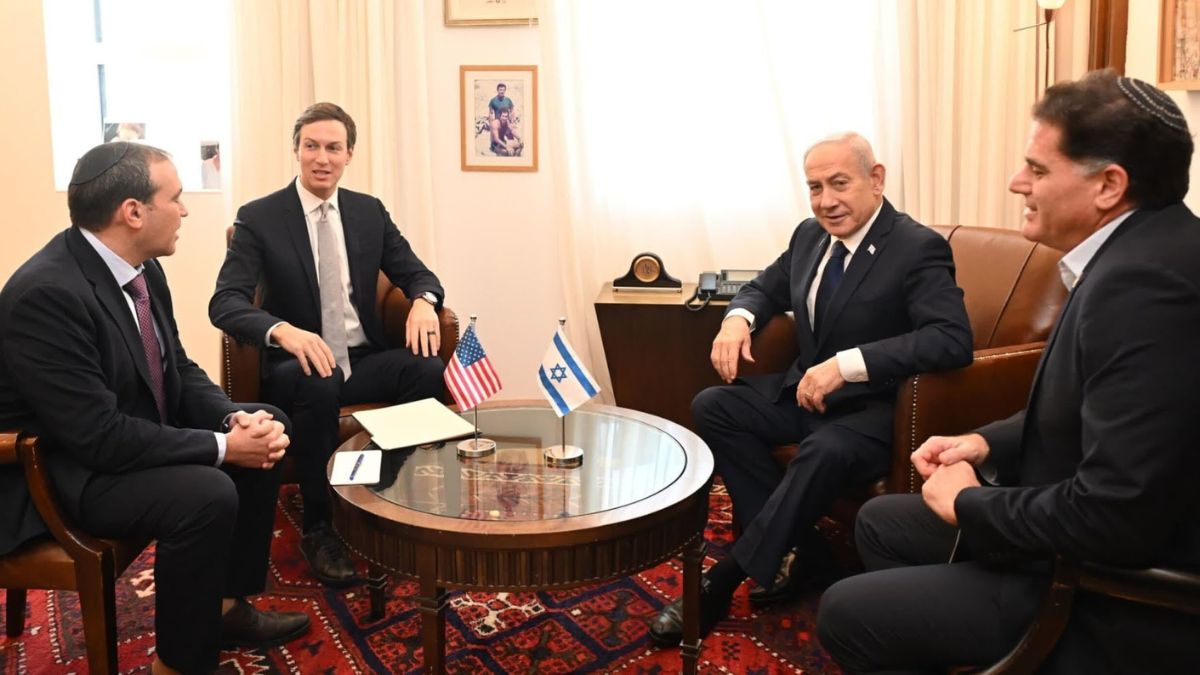Gaza ceasefire phase two: Kushner and Netanyahu tackle disarmament challenges
 U.S. envoy Jared Kushner met Israeli Prime Minister Benjamin Netanyahu in Jerusalem to discuss phase two of the Gaza ceasefire | X
U.S. envoy Jared Kushner met Israeli Prime Minister Benjamin Netanyahu in Jerusalem to discuss phase two of the Gaza ceasefire | X
US mediator Jared Kushner, the son-in-law of President Donald Trump, met in Jerusalem on Monday with Israeli Prime Minister Benjamin Netanyahu to discuss the next stage of the United States–brokered ceasefire plan in Gaza. The meeting focused on moving from the current truce to Phase Two of the agreement, centred on disarming Hamas, demilitarising Gaza, and establishing an international stabilisation force to oversee security and reconstruction in the enclave.
The meeting came a month after Washington and its partners brokered a truce following two years of heavy fighting. Kushner was joined by Israel’s Strategic Affairs Minister Ron Dermer and Aryeh Lightstone, adviser to US Middle East envoy Steve Witkoff. Witkoff is expected to visit soon, part of a broader push by the Trump administration to revive its peace plan.
The ceasefire’s first phase brought some progress through prisoner and hostage swaps. Hamas freed 20 hostages and the remains of 24 others, while Israel released nearly 2,000 prisoners and returned 315 Palestinian bodies. But the truce remains shaky. Despite the truce, Israeli forces have killed at least 242 Palestinians. Many in Gaza say they still feel unsafe, with sporadic gunfire and limited access to aid.
Phase Two is proving far more complex and politically sensitive. Its main goals include the complete disarmament of Hamas, the full demilitarisation of Gaza, and the exclusion of Hamas from any future governing arrangements in the territory. Netanyahu has stated that Gaza will be demilitarised “either the easy way or the hard way,” underscoring Israel’s determination to enforce these terms. Israel is also seeking written assurances from Washington guaranteeing its right to re-enter Gaza should disarmament stall or fail to meet agreed benchmarks.
The Rafah tunnel situation is developing into a major challenge, with an estimated 200 Hamas fighters remaining trapped in tunnels beneath Israeli-controlled areas. The United States has been trying to develop this into a test case for the wider disarmament process. The plan under consideration would allow the fighters to surrender their weapons in exchange for safe passage to a third country, forming a pilot scheme for a broader amnesty initiative. Israel has publicly opposed the idea, though diplomatic sources suggest it has not been entirely ruled out in private. Hamas, however, insists that surrendering its arms is a “red line.” Any Israeli attempt to forcibly remove the fighters could collapse the ceasefire entirely, making the Rafah tunnels a delicate flashpoint with significant implications for the success of the overall plan.
Plans for an international stabilisation force have also run into trouble. Jordan will not send troops, Israel has blocked Turkish involvement, and Azerbaijan says it will only join once a full ceasefire is in place. The UAE has voiced similar reservations. Envoy Dr Anwar Gargash said yesterday that Abu Dhabi “does not yet see a clear framework for the stability force” and will not take part under current terms, though it will continue political and humanitarian efforts.
Arab governments are also concerned that the stabilisation force could evolve into a de facto governing authority in Gaza, undermining plans to establish a Palestinian technocratic committee to manage civil affairs. They are also worried about the broader framework of the US-drafted resolution, which is not so forthcoming about the two-state solution. France and Saudi Arabia are pushing for such language to be included, and Riyadh has made clear that a reference to Palestinian statehood is a prerequisite for its support.
Despite these divisions, Netanyahu has vowed to enforce the ceasefire “with an iron fist.” He said Israel remains determined to recover the four slain hostages still in Gaza and to ensure Hamas is fully disarmed. “The war has not ended,” he said. “Gaza will be demilitarised — one way or another.”
Middle East